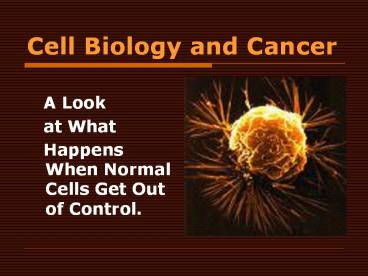Cell%20Biology%20and%20Cancer - PowerPoint PPT Presentation
Title: Cell%20Biology%20and%20Cancer
1
Cell Biology and Cancer
- A Look
- at What
- Happens When Normal Cells Get Out of Control.
2
What Is Cancer?
- Cancer is the uncontrolled growth of abnormal
cells which can overwhelm the tissue, organ, or
even the entire system. - Oncology is the study of Cancer
- Taken from What you Really Need to Know
about Cancer -1997 Dr. Robert Buckman
3
Some Statistics on Cancer
- Cancer is the Second Leading Cause of Death.
- It is Second only to Heart Disease.
- In 2003 the Center for Disease Control (CDC)
reported that cancer was the number one cause of
death in the US for people between the ages of
45-64.
4
Cancer in the United States
- 1 out of 3 people will develop a form of cancer
sometime in their lives. - 1 out of every 4 diagnosed with cancer will die.
- More than 1,500 people die of cancer every day.
5
Cancer in the United States
- In 2006, 2.5 million new cases of cancer were
diagnosed. - In 2005, the National Institute of Health (NIH)
reported that the cost associated with cancer was
over - 210 billion.
6
Cancer and Women
- Women are more frightened of getting
- cancer versus heart disease even
- though heart disease kills more than
- eight times as many women each year.
7
Cancer is Not a Disease . . .
- it is a process that is shared by different
diseases. - There are over 200 diseases that make up the
cancers. - All cancers share some common features.
8
Common Features
- Cancer is what happens when a group
- of cells
- grow disorderly and multiply uncontrollably.
- invade neighboring tissue.
- spread to distant parts of the body.
9
Cancer Cells Grow Uncontrollably
- Cells have a mechanism that keep them growing and
reproducing in a normal and orderly way. - The Cell Cycle is that Process!
10
Normal Cell Growth and Reproduction in an Orderly
way
- The process that controls normal cell division of
body cells is called Mitosis. - Meiosis is the process that controls the division
of gametes
11
Cancer Cells Growth Disorderly
- Cancer cells are able to escape the cells
control mechanisms - Accelerated growth occurs in a disorderly way
resulting in a Tumor.
12
Cancer Cells Invade Neighboring Tissues
- Cancer Cells
- have the ability to cross normal boundaries and
invade surrounding tissues. - can avoid the mechanisms of contact inhibition.
13
Cancer Cells Spread to Different Parts of the Body
- Cancer Cells can
- travel to distant areas
- of the body through
- the
- bloodstream
- Lymph vessels
14
Summary
- Five Basic Properties of Cancer Cells
- 1. Uncontrollable growth reproduction
- 2. Invasion of surrounding tissue
- 3. ability to travel via the blood stream or
lymph vessels - 4. ability to establish secondary tumors
- 5. ability to produce substances that interfere
with body functions
15
There are 5 Major Types of Cancers
- 1. Carcinomas
- The most common form of cancer
- Solid tumors that can affect any part of the body
- Spread via bloodstream lymphatic fluid
- Form in epithelial cells
- skin, mouth, nose, throat, lungs
- Genitourinary and gastrointestinal tracts
- Glands breast and thyroid
16
Five Types of Cancer . . .
- 2. Leukemias
- Formed in blood and bone marrow
- Not solid tumors
- Abnormal white blood cells that replace healthy
WBC - Abnormal cells circulate throughout the
bloodstream
17
Five Types of Cancer . . .
- 3. Myelomas
- Tumors that originate in plasma cells
- Once considered rare, but incidences are
increasing - Plasma cells are the antibody-producing WBC that
are located in the bone marrow
18
Five Types of Cancer . . .
- 4. Lymphomas
- Occurs in glands and nodes of the lymphatic
system. - Lymph nodes are the bodys filtering system that
removes toxins and impurities from the blood.
19
Lymphomas
- Lymph nodes are found in the
- Neck
- Groin
- Armpits
- Spleen
- Center of chest
- Around the intestines
20
Lymphomas
- Solid Tumors
- Usually formed from abnormal WBC
- Most common forms of are
- Hodgkins
- non-Hodgkins
21
Five Types of Cancer . . .
- 5. Sarcomas
- Rarest of all cancers
- Most challenging prognosis
- Solid tumors
- Arise from connective tissue, mostly bone
22
However Sarcomas can
- arise from muscle tissue and invade tissues such
as - Bladder
- Kidneys
- Liver
- Lungs
- spleen
23
Carcinogenesis































